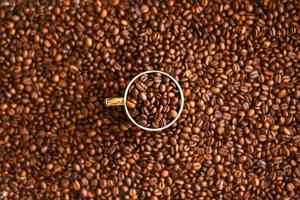
Is drinking coffee good for your health? Or is it bad for you?
Often, we seem to receive conflicting information on this subject from the media.
And while there are good reasons we probably really don’t want a straight answer to the question…some of us are just too curious to resist the urge to dig a little deeper!
So, is that morning joe beneficial or not, strictly from a health standpoint? Let’s find out.
Note that this post will strictly examine black coffee—not sweetened or flavored coffee beverages. Introducing flavored syrups to the equation definitely dips the balance in the direction of unhealthy.
Pros
- B vitamins. Coffee contains two important B vitamins—B2 (riboflavin) and B5 (pantothenic acid). Vitamin B2 helps the body process other dietary nutrients. Vitamin B5 maintains digestive and adrenal health.
- Potassium and magnesium. Caffeine is not the sole benefit from coffee. Coffee happens to contain potassium and magnesium. Granted, there are many more potent sources of potassium and magnesium, but if your diet is deficient in fruits and vegetables, the coffee is probably what’s keeping you going.
- Antioxidants. You know what antioxidants are—those celebrated substances that help your immune system ward off free radicals. A serving of coffee often contains more antioxidants than some fruits!
- Improved physical performance and endurance. The caffeine in coffee raises your adrenaline levels, in turn enhancing your physical output. Here’s a tip for maximizing the benefits—drink your coffee black, and enjoy it about an hour before exercising. Drinking coffee has also been linked with improved endurance in long-duration physical activities.
- Improved cognitive function. Drinking anywhere from one to six cups of coffee a day will give you a dose of caffeine sufficient to keep you alert and focused. Some researchers have even found that coffee drinkers learn new information more readily than non-drinkers. Want an even bigger boost? Pairing a cup of coffee with something sweet appears to improve attention levels and working memory better than either treat alone.
- Improved mood. Caffeine stimulates the nervous system and promotes the production of key neurotransmitters, which in turn are necessary for mood health.
- Reduced risk of Parkinson’s disease. Some research suggests that coffee may reduce the risk by as much as 25%! Caffeine appears to stimulate the part of the brain affected by Parkinson’s and to protect the brain cells that produce dopamine, a neurotransmitter crucial for preventing the disease. Men appear to benefit more than women in this area.
- Reduced risk of stroke. Drinking three to four cups of coffee a day is associated with a lower risk of stroke. You can reap these benefits from decaffeinated coffee as well as caffeinated. Note, however, that those who are not used to drinking coffee may see a sudden increase in their risk of stroke immediately after consumption.
- Reduced risk of heart disease. Some studies have demonstrated that drinking two to three cups of coffee a day can lower your risk of heart disease by 21%. The benefits appear to wane for those who drink six or more cups each day. Women appear to benefit from coffee consumption more than men in this area.
- Reduced risk of liver damage. This one applies only to people who are otherwise at risk for liver disease. Furthermore, the benefits are largely lost in filtered coffee. Several substances found in French press or boiled coffee are associated with lower enzyme levels, which in turn are associated with less liver inflammation and damage.
- Reduced risk of diabetes. Although drinking coffee can cause a short-term blood sugar spike, habitual coffee consumption can help stabilize your insulin levels, reduce your glucose absorption, and help your body process what glucose it does absorb more efficiently. Three to six cups a day appears to maximize the benefit. Also, decaffeinated coffee produces the same effect as caffeinated in this regard.
- Reduced risk of stones. Consistent coffee consumption may prevent cholesterol from crystallizing in the gallbladder in the form of stones. Furthermore, it may keep the system flushed out by increasing bile flow. Coffee is also beneficial in reducing the risk of kidney stones.
- Reduced risk of cancer. Contrary to popular belief, science has failed to find a link between coffee and cancer. In fact, coffee is surprisingly powerful in its cancer-fighting ability for reasons ranging from anti-inflammatory effects to beneficial plant chemicals. Coffee’s cancer-fighting benefits appear to be particularly powerful in the areas of liver, colon, prostate, and endometrial cancers. Caffeine may also prevent the development of basal cell carcinoma, the most common type of skin cancer.
Cons
- Potential for toxins. Not all coffee is created equal. Cheap coffee often contains impurities, including heavy doses of numerous herbicides and pesticides. These chemicals can in turn cause headaches or general feelings of sickness—not to mention add a cancer risk not found in the pure, unadulterated coffee bean. Also, the solvents used to make decaffeinated coffee may contribute to rheumatoid arthritis.
- Restlessness and anxiety. This is due to caffeine. Whether or not coffee will have this effect on you largely depends on whether you are genetically predisposed to caffeine sensitivity. Going cold turkey on caffeine can make the symptoms worse.
- Insomnia. One of the well-known downsides of caffeine. Some people are genetically sensitive to caffeine and will have to find their own caffeine limit. For most people, though, the recommended safe maximum is four cups of coffee per day.
- Increased risk of osteoporosis. Coffee causes the body to excrete calcium, which can in turn lead to brittle bones in people (especially women) who drink four or more cups a day. Fortunately, you can counterbalance this effect fairly easily. Just consume about two tablespoons of milk or yogurt for every cup of coffee you drink (you don’t have to put the dairy into the coffee to reap the benefits).
- Stomach irritation. Caffeine and several other compounds found in coffee stimulate the stomach lining to produce more acid. This can lead to a major stomachache in some people. When roasted, however, coffee beans produce another substance that blocks stomach acid production. Therefore, if your stomach is sensitive to coffee, you may be able to enjoy a darker roast. Cold brew and decaf are also options for those who suffer from stomach difficulties. As a final tip, eating something with your coffee will reduce the pain by giving the surplus acid something to work on.
- Gastroesophageal reflux. If you already are prone to reflux, coffee can make it worse.
- Dehydration. Coffee is a mild diuretic. While most scientists do not consider coffee to present any dehydration risk, and some even encourage counting a cup of coffee toward your daily fluid intake goals, the fact remains that many people do not drink enough water as it is. So be sure to balance out that extra cup of coffee with an extra glass of water.
- Pregnancy risks. Unborn babies absorb caffeine all too readily, leading to death and low birth weights. How much caffeine produces adverse effects is currently being debated. Drinking no more than one cup of coffee a day is a common recommendation.
Conclusion
So is coffee good for you? Most scientists still hesitate to go that far. On the other hand, most are now willing to concede that, as long as you are not a caffeine-sensitive individual, coffee probably isn’t bad for you. For most people, there is absolutely no reason not to enjoy a moderate amount (two to four cups) of coffee every day. You might even reap some health benefits.
Some people, however, are sensitive to the effects of caffeine. For them, what is typically termed “moderate” coffee consumption will probably produce side effects that are not enjoyable. While they do not necessarily have to forego coffee altogether, they may have to experiment to find a lower amount that will not wreak havoc on their nerves and digestive systems. These people will probably not be able to reap the full benefit of coffee consumption.
Whatever your coffee tolerance level is, enjoy it with a snack and follow it up with plenty of water. Some of the coffee benefits are maximized with a sweet treat. The potential for stomach irritation will be minimized, as well. The water will help avoid dehydration due to the diuretic effect.
Finally, if you are really wanting to boost your vitamin, mineral, and antioxidant levels, incorporate more fruits and vegetables into your diet rather than relying on coffee to supply your deficit. Here’s a challenge—try eating some colors!
Helpful Resources
Coffee Warning Label Conflicts With Public Health Guidance
Is coffee really a potential carcinogen? Probably not.

